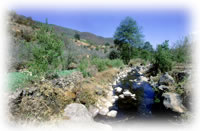 |
 |
||
 |
|||
|
RELATED THEMES agriculture environment forestry spiritual beliefs OTHER LOCAL THEMES BACKGROUND |
water
Rainfall and water has been valued for generations. One resident (Mexico 12) of Yavesía explains: "[An] archaeologist.said to us, 'Do you know what? Well, Yavesía. this was a place of worship for Guzio (Zapotec deity, "lord of the mountains", said to live in the Sierra Norte and to take care of mountain people and their resources), the rain god.' Then he explained.there was the statue of Guzio. this was a very important centre of worship, a culture connected to the rain. Rain is what brings you water so that there's life. So I now understand why [Yavesia] is a village that has fought so dedicatedly to conserve its resources." An elderly farmer (Mexico 24) from El Punto in the municipality of Ixtepeji talks of how the community's means of obtaining water has improved from when he was a boy and had to drink from jagueyes, ditches or springs from which cattle drank. In the same community another narrator tells of fetching and carrying water in pitchers, or in tanks carried by animals. The first piped, potable water supply to reach the community was in 1960: ".at that time it was very difficult to get water. my late husband brought the water in tambos from a well that we called El Militar. And then they also brought water from another well. we did not have drinking water until 1960. Year by year the water came closer and closer. But before that, we suffered a lot.we had to carry it in pitchers." (Mexico 27). A similar story is told in Ixtlán. The following narrator (Mexico 15) describes how much of the tequio (community service) in his youth was devoted to laying wooden irrigation channels to bring water: ".about 35 years ago.the water had to come from about 4 or 5 km away. All the material needed to lower the wooden channels had to be taken to the places where it was difficult for the water to pass. People who had horses, donkeys or oxen, took their animals to pull and to drag [them]. There were some people who were very skilled with the axe, at cutting the [wood used for] wooden channels... [so this was how] they brought the agua rodada (literally, "travelled water", water for irrigation)." Now, he says, water is piped to the community: ".there has been a definite improvement, right? They don't perform the tequios to bring the water now. Now the water.is used for sprinkle irrigation, which is a very good improvement for our community, for our agriculture above all." While water access has improved, the more remote communities still lack good sanitation; the traditional doctor (Mexico 4) encourages her fellow villagers to improve facilities: "Promotion of hygiene is very important too, we encourage hygiene, toilets and everything to change the way of life. so [people] don't get sick". Several narrators talk of recent changes in rainfall patterns. In the case of Yavesía, this has at times produced a noticeable reduction in the flow of the large stream which runs through the middle of the village (Mexico 12): "The recent droughts of 97- 98 made the importance of looking after the environment known, because they saw, felt and lived it and we saw that the flow of water in the river went down a lot. There were years when, for example, the corn and fruit harvest were very bad and the people said that it was because the weather was changing." In Ixtlán, one woman points out that where agriculture used to be rainfed, it can no longer rely on sufficient precipitation (Mexico 16): ".given the lack of rain. the land which doesn't have irrigation doesn't produce anything - and it did before, because it rained more in this month of May. There were at least a few big downpours and the corn plants were big." It seems, however, that irrigation has been used in at least some parts of her community, at certain altitudinal zones, all her lifetime: ".the irrigation was day and night to make the most of the water because we only had it for a determined time. everyone was given his time to water his land." There is great concern in Tiltepec as to the effects of tree-felling on water availability, especially on the upper mountain slopes: "It's because we cut down trees, that's why we're lacking water.I think that it's because of the deforestation that the rain has left us. Before, when I was still a boy, well, there was a mist in the mountains almost all year but now it doesn't rain anymore." (Mexico 3). Locally, as well as more widely in the Sierra Norte, forest fires have occurred in recent years and another Tiltepec resident directly links this cause of forest loss to negative impacts on the water regime (Mexico 9): ".what happened to us last year, that hurt us a lot.they told us that the people who live there, above the agencia (community office), all over that way, well they almost didn't have any water to drink, because of... the fires.All of that area was burnt. there's a spring a bit below - and as it got burnt above, that's why the poor people didn't have water to drink." Some uncertainty remains, however, as to the reasons for wider changes in climate (Mexico 3): ".we don't really know why [these changes are occurring]. Maybe it's the world that's changing." quotes about water".if we continue clearing the pure high up forest, I think that within five or six years it won't rain anymore. Yes, because that's what's happening in other areas." "I asked them to explain to me why the people of Yavesía have this strong trait of conserving its resources, of looking after them. [they said] if there are trees, well, there are birds and there's rain, and if there are no trees, there is no rain, and the rain is what brings you water.[and] water is life." "We're cutting down the trees close to the high mountains and that's why water is scarce, that's why there are fewer old trees.[and] these trees help the land. in my way of thinking we are finishing ourselves off by killing the forest." "When I arrived here...about 27 years ago.it rained a lot then... I mean sometimes it could rain for up to 20 days, day and night. We couldn't do anything. My God! It really poured. Well it doesn't rain much now, a night or two and that's it, just two or three days. It's changing now [because of deforestation]. When I lived below La Luz there was still forest they hadn't cut down yet. A little later they finished it off, they cleared all these areas." |
|
 Issues around access to water - for household and productive use - are mentioned by many narrators. Generally, although means of access have improved, there is concern about the impact of deforestation and changing patterns of rainfall on the supply.
Issues around access to water - for household and productive use - are mentioned by many narrators. Generally, although means of access have improved, there is concern about the impact of deforestation and changing patterns of rainfall on the supply.